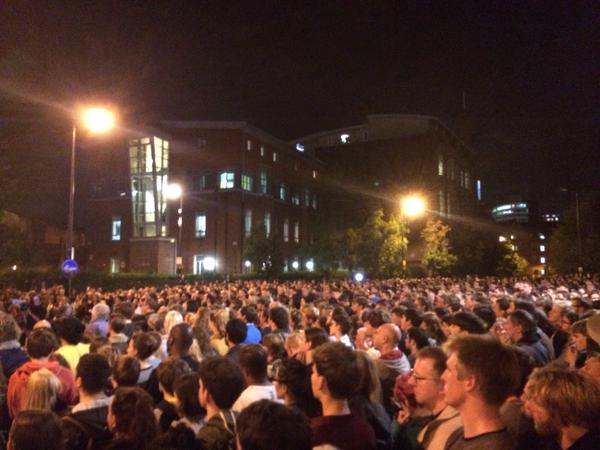
Today the Jeremy Corbyn for Labour Leader campaign has become Momentum. Calling itself “a network of people and organisations that will continue the energy and enthusiasm of the of Jeremy’s campaign,” the campaign is specifically geared towards creating a mass movement oriented to Corbyn’s aims both within the Labour party and beyond it.
Here are a few quick thoughts on the project:
1. Momentum is a recognition that many people see themselves as joining Corbyn specifically.
My mum voted Labour in the last election on a ‘get the Tories out’ basis, but after seeing Corbyn speak at a leadership campaign rally in Sheffield she became a Labour member and was elated when the leadership results came in.
The story will be the same for many people – little love for Labour historically, never involved in formal politics, but a genuine enthusiasm for getting behind that rarest breed of politician: someone honest, principled, and with an actual understanding of what austerity is doing to working class people.
By adopting a one-foot-in, one-foot-out stance with respect to Labour, Momentum is acknowledging that many want to see Corbyn succeed but won’t necessarily throw themselves into Labour just yet.
2. There’s a potential to use tools from the US.
A key plank of the US Democrats’ campaigning approach over the past ten years has been the 50-State Strategy – “an ambitious effort to build the Democratic Party from the ground up in every single precinct, city, and state in the country.”
Similarly, Momentum seeks to “organise in every town, city and village to create a mass movement for real progressive change.”
It’s likely that as Momentum progresses it will also look to adopt other social base strategies from the US such as Drinking Liberally, a nationwide social group for talking politics over a pint with 183 local chapters.
3. Momentum is looking to consolidate Corbyn’s strengths.
Though some MPs might be being won round, it’s fair to say Corbyn’s main allies are outside of parliament. Momentum will attempt to give (and take) structure and direction from union branches, sympathetic community Labour parties, single-issue campaigns, and local groups of new Labour members and supporters.
Aside from his broad support base, one of Corbyn’s biggest assets is his ability to come across as someone in-touch with the public – something many career politicians spend years trying to craft. If Momentum pulls off its stated focus of improving people’s lives with micro level collective action, there’s a clear possibility for Corbyn to galvanise such a base nationally come 2020.
4. There is likely to be some PLP conservativism.
Even with Momentum being formally independent of the Labour leadership, there are bound to be members of the parliamentary Labour party (PLP) who will be hostile to the idea. Though the argument will be probably be that Momentum is a crafty way of circumventing the party’s formal structures, the reality is some PLP members will be conservative to what they perceive as a flow of power away from them.
Whether they like it or not, this is all part and parcel of running a democratic campaign; an uphill challenge in a party which has eroded many of its previous democratic structures over the last 25 years.
5. Left populism this way comes?
Welcoming the launch of Momentum, Corbyn said: “We need us to put our values, the people’s values, back into politics.”
Such a phrase could easily have come from the mouth of Pablo Iglesias of Podemos or Alexis Tsipras of Syriza (pre-capitulation). Leaving sufficient room for interpretation, ‘the people’s values’ will likely be shaded in over the coming years as Corbyn’s 2020 strategy takes shape. The difference with previous election campaigns is the policy consultations Momentum envisions are likely to ditch the focus groups in favour of broader democratic participation.
6. This could be a big boost to future voter registration drives.
As many commentators have said, Labour is going to have to undertake perhaps the biggest voter registration drive in history if it is to oust the Conservatives in 2020.
Typically these registration drives are as uninspiring and out of touch as the politicians on offer: see the Electoral Commission’s dull About My Vote website or the National Union of Students’ #GenerationVote campaign for an idea. If Momentum can create and sustain a mass social base reaching right to every supporter, Corbyn will have a much easier job of getting would-be voters registered.
7. Mainstream political journalists won’t know where to start.
It’s already the case that many a mainstream political journalist is having to deal with becoming just another unrecognisable face in the crowd as far as the new Opposition is concerned. If they didn’t like their carefully curated phonebook of Labour’s rising stars becoming redundant, they certainly won’t like the unorthodox approach to electoral politics represented by Momentum.
If mainstream political journalists want to keep ahead of the pace they’re now going to have to jump into the world of social media campaigning and grassroots assemblies, and could even find themselves playing catch-up with the enfants terribles of digital journalism.
–
Novara Media is trying to raise £10k in just 30 days. To support our mission to create media for a different politics, go to support.novaramedia.com. Help us spread the word using the hashtag #Novara10k!